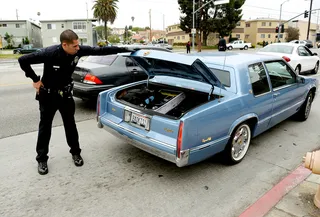What to Do If You're Stopped by the Police
Check out important tips for understanding your rights.

1 / 13
A Crucial Checklist - From Chicago to Ferguson to Prairie View, Texas, a string of deadly encounters between police and African-Americans has thrust police brutality into the national spotlight. To help individuals better navigate interactions with law enforcement when stopped, questioned, arrested or injured, the American Civil Liberities Union (ACLU) has compiled several suggestions to ensure these encounters remain peaceful and constitutional. — Patrice Peck with reporting from AP(Photo: Hill Street Studios/Getty Images)

2 / 13
Keep Calm - When stopped by the police, make sure to remain calm and in control of your emotions, words and body language, the ACLU advises. What you say is always significant, because anything you say or do can be used against you.(Photo: Andrew Burton/Getty Images)

3 / 13
No Arguing - Avoid confrontations with officers. If you feel you must inform police they are wrong, tell them in a non-argumentative way.(Photo: Shannon Stapleton/Reuters/Corbis)

4 / 13
Keep Your Hands Visible - Keep your hands in plain sight and do not touch the officers or resist physically, even if you believe you are innocent. (Photo: Jeff Roberson/AP Photo)

5 / 13
Ask for a Lawyer - Request a lawyer immediately if officers decide to arrest you. Having a lawyer present while you explain your situation and defend yourself will likely help you avoid hurting your own case. (Photo: John Gress/Reuters/Landov)
ADVERTISEMENT

6 / 13
Know Your Rights - As ACLU reports, you have the right to request officers’ names, badge numbers and business cards. Also, try to remember physical descriptions of the officers and their patrol car numbers.(Photo: Fuse/Getty Images)

7 / 13
Consent for Search - You never have to give permission for a search of yourself or your personal belonging, including your car or cellphone. If you choose not to, simply say, “I do not consent to this search.” Ask to see the officers’ search warrant if they claim to have one. (Photo: Kevork Djansezian/Getty Images)
Photo By Kevork Djansezian/Getty Images

8 / 13
Eye-Witnesses - Find witnesses of the encounter, if possible, and record their names and phone numbers. (Photo: Jessica Rinaldi/Reuters/Corbis)

9 / 13
Document Your Injuries - If you are hurt during the encounter, take photos of the injuries as soon as possible, but make sure to seek medical attention first. Request copies of your medical treatment files. (Photo: Seth Wenig/AP Photo)

10 / 13
Write It Down - Most importantly, write down everything you remember about the encounter as soon as possible. If you feel your rights were violated during your encounter, file a written complaint or call your local ACLU.(Photo: Brooke Fasani/Getty Images)
ADVERTISEMENT

11 / 13
Technological Solutions - (Creators of the Driving While Black app in Portland, Ore., from left, software developer James Pritchett, lawyers Mariann Hyland and Melvin Oden-Orr. Photo: AP Photo/Driving While Black)AP spoke with Portland police spokesman Pete Simpson about the recent wave of mobile app developments, such as the Portland-based Driving While Black app, aimed at encouraging safe encounters with police.

12 / 13
Take the High Road - “If you're right and the officer is wrong, it's better to take the high road during a stop and take it up later,” said Simpson. "Know your rights and exercise them, but be safe about it."(Photo: Julie Dermansky/Corbis)
